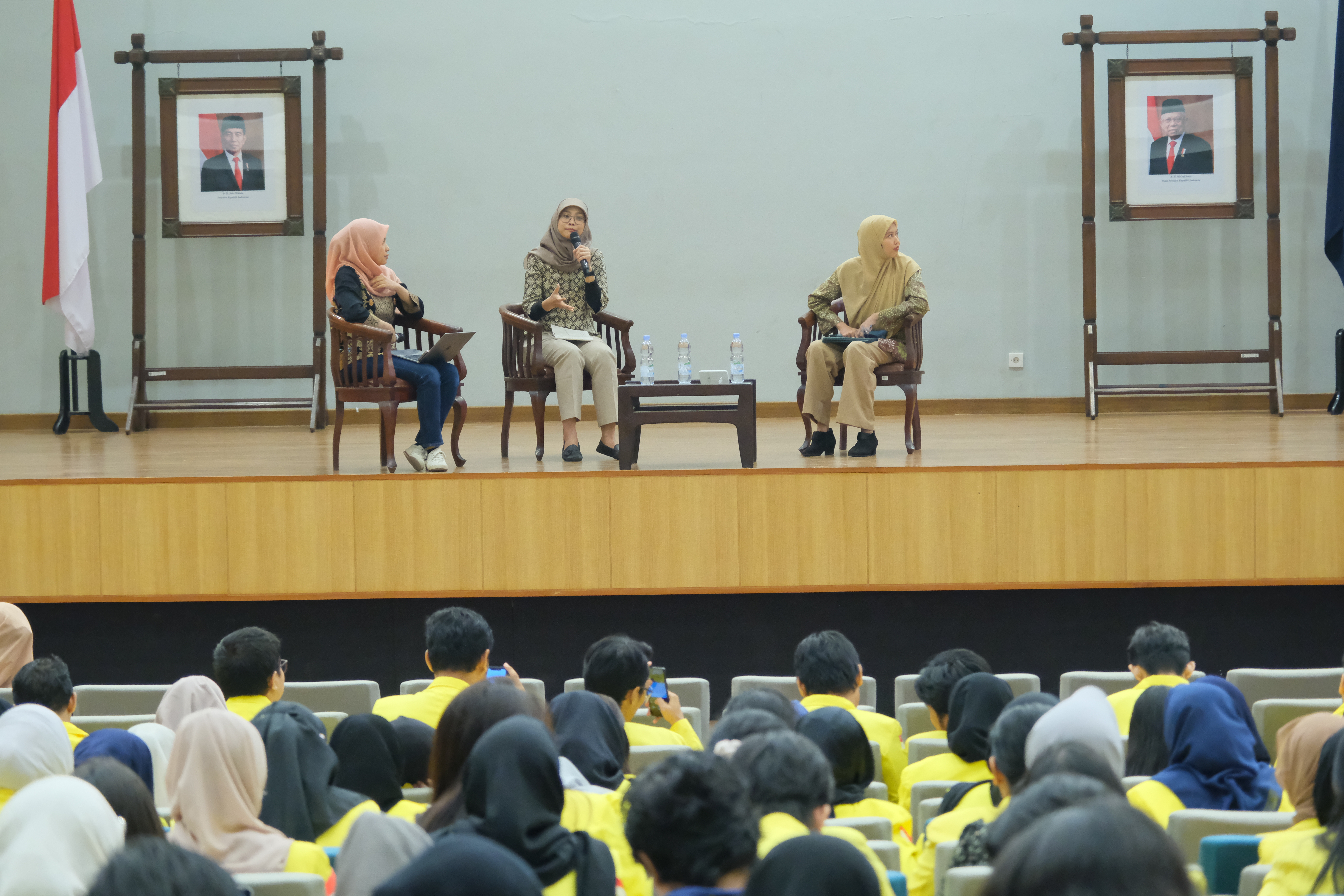Indonesia is currently realising the acceleration of sustainable infrastructure development to achieve economic recovery goals. The Environmental Engineering Study Programme, Faculty of Engineering, University of Indonesia (PSTL FTUI) as part of the best educational institutions in Indonesia contributes solutions to achieving Sustainable Development Targets, such as drinking water supply, sanitation, waste management, and climate change adaptation and mitigation. To raise the awareness of the academic community, PSTL UI held an Open Class and Face-to-Face Kick-off of PSTL UI batch 2023/2024 (09/11) at Balai Purnomo UI with the theme “Current and Emerging Issues and Prospects for Sustainable Infrastructure Development for Indonesia Emas 2045.”
The event was attended by two expert speakers, namely Budiasti Wulanssari, S.T., M.Sc.Eng., Environmental Programme Specialist – Chemistry & Waste at H&M Group, and Terra Prima Sari, S.T., M.Sc., Environmental Health Engineering Associate Expert Subdirectorate Region II, Directorate of Sanitation, Directorate General of Human Settlements, Ministry of PUPR. Also present as moderator was Dr. Cindy Rianty Priadi, S.T., M.Sc., Head of the Environmental Engineering Study Program, DTSL FTUI.
In his remarks, Prof. Dr. Ir. Yanuar, M.Eng., M.Sc., Vice Dean for Education, Research and Student Affairs said, “With the Sustainable Development Goals (SDGs) target that must be achieved in 8 years and in achieving the Golden Indonesia Vision 2045, I believe the Environmental Engineering Study Program (PSTL) FTUI can take an active role in formulating steps in achieving and realising SDGs related to the environment through the preparation of human resources (HR) who have a strong foundation in environmental engineering.”
“In recent years, the global industrial landscape has widely integrated the Sustainable Development Goals (SDGs) into their various programmes.” This was revealed by resource person Budiasti Wulanssari at the opening of her presentation. Budiasti explained the sustainability strategy that H&M has implemented, namely leading the change, where H&M is expected to be a company that continues to innovate, support a circular-based fashion industry with a neutral climate impact, and ultimately, become a fair and equal company, with the basic principle of having a positive and responsible impact both environmentally and socially.
To realise sustainability, we need to change our consumption patterns by applying the principle of “3M,” which is Reduce, Reuse and Recycle. For example, H&M has made improvements to its raw materials to make them more recyclable and organic. In addition, H&M has a programme for suppliers or partner factories, namely SIPP (Sustainable Impact Partnership Program), where H&M and partner stakeholders jointly realize the agreed sustainability commitments, by implementing sustainability actions according to H&M standards and local government regulations.
“On the other hand, H&M also collaborates with several research bodies to conduct research in addressing microplastic/microfibre issues, as well as developing this infrastructure to be available in the industry, conducting wastewater test monitoring efforts, focusing on Key Performance Indicators or KPIs, and controlling IPAL assessments,” Budiasti further explained.
In the PUPR sector, Terra Prima Sari explained that PUPR has waste management targets in the 2030 SDGs. These targets include making cities and settlements inclusive, safe, resilient and sustainable, and ensuring sustainable production and consumption patterns. PUPR is also committed to preserving and sustainably utilising marine and oceanic resources, taking rapid action to address climate change and its impacts, and has a target of NO landfill by 2045, where only residual waste enters the landfill to minimise the entry of waste into the landfill, as well as realising a circular economy.
Terra also shared information on PUPR’s efforts in overcoming Indonesia’s increasing waste management problems. PUPR endeavours to ensure that local governments have more capacity to manage waste by implementing waste/cleaning service fees.
“Currently, waste payment in Indonesia has only reached the waste collection stage at the neighbourhood level, but not to the local government. This is a huge burden for local governments as they have to bear the cost of waste management from landfill to temporary shelter (TPS), which is very expensive. Therefore, to realise the success of good waste management, it is necessary to start with good redistribution, followed by good service as well,” said Terra.
The open lecture session closed with a discussion of career opportunities in Environmental Engineering. Currently, there are many career opportunities for Environmental Engineering, both in the government and stakeholders. However, on the other hand, Indonesia still lacks experts who have expertise focused on the environment, such as waste experts, wastewater experts, drainage, air pollution, and others. This is a great opportunity for UI Environmental Engineering students to develop their expertise in these fields.
If we refer to the data on jobs in the field of Environmental Engineering in Linkedin between 2018-2022, the most needed jobs are related to sustainability, such as sustainable manager, sustainable analyst, and sustainable specialist. Environmental problems and sustainability issues will continue to exist and never stand alone because they will always be related to social effects, social impacts, and other social elements. Therefore, expertise and problem-solving from experts in their fields are needed.
Met on a separate occasion, the Dean of FTUI, Prof. Dr. Heri Hermansyah, S.T., M.Eng., IPU, said “I hope that the open class held by PSTL UI can open our insights into the development of environmental and sanitation infrastructure, as well as the participation of the academic community and alumni in its development, to participate in realising the Vision of Advanced Indonesia and Superior and Quality Human Resources, and contribute to realising the dream of a sustainable Indonesia.”
***
Public Communication Office
Faculty of Engineering, University of Indonesia

